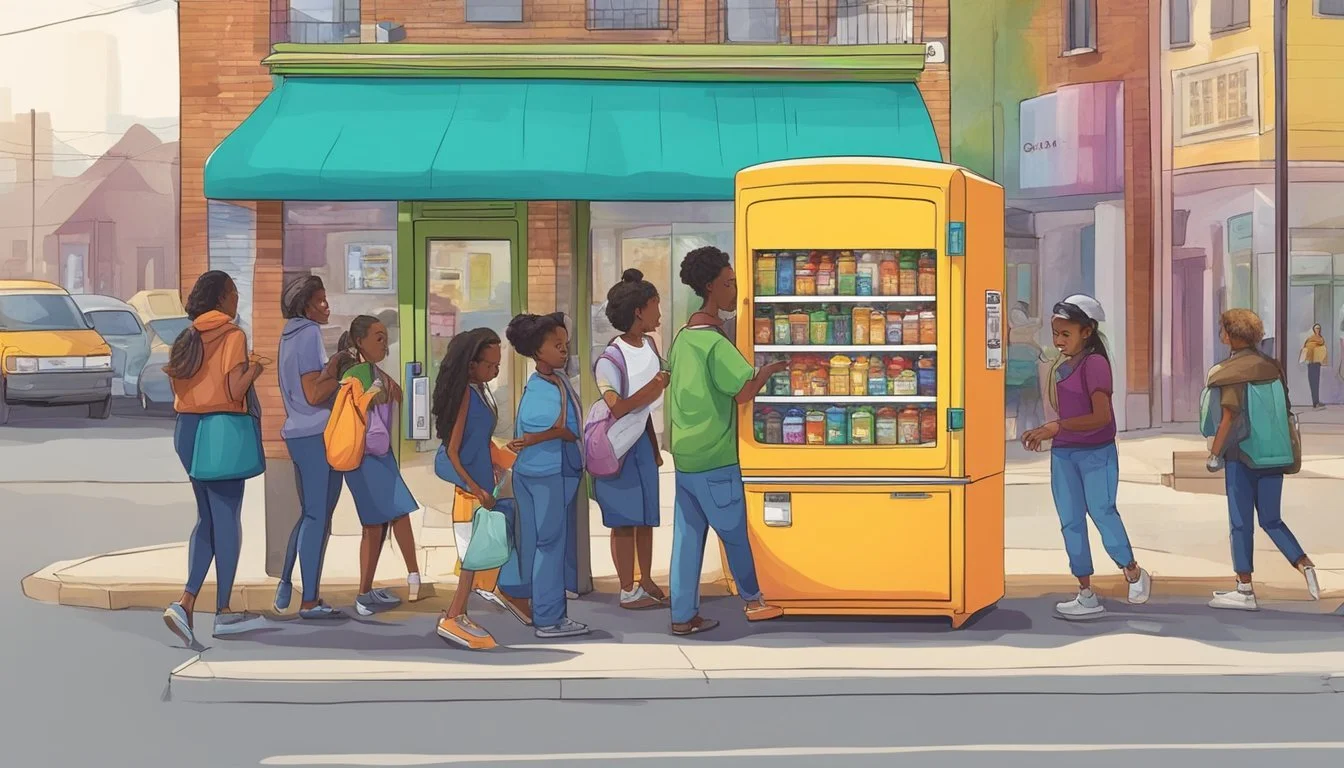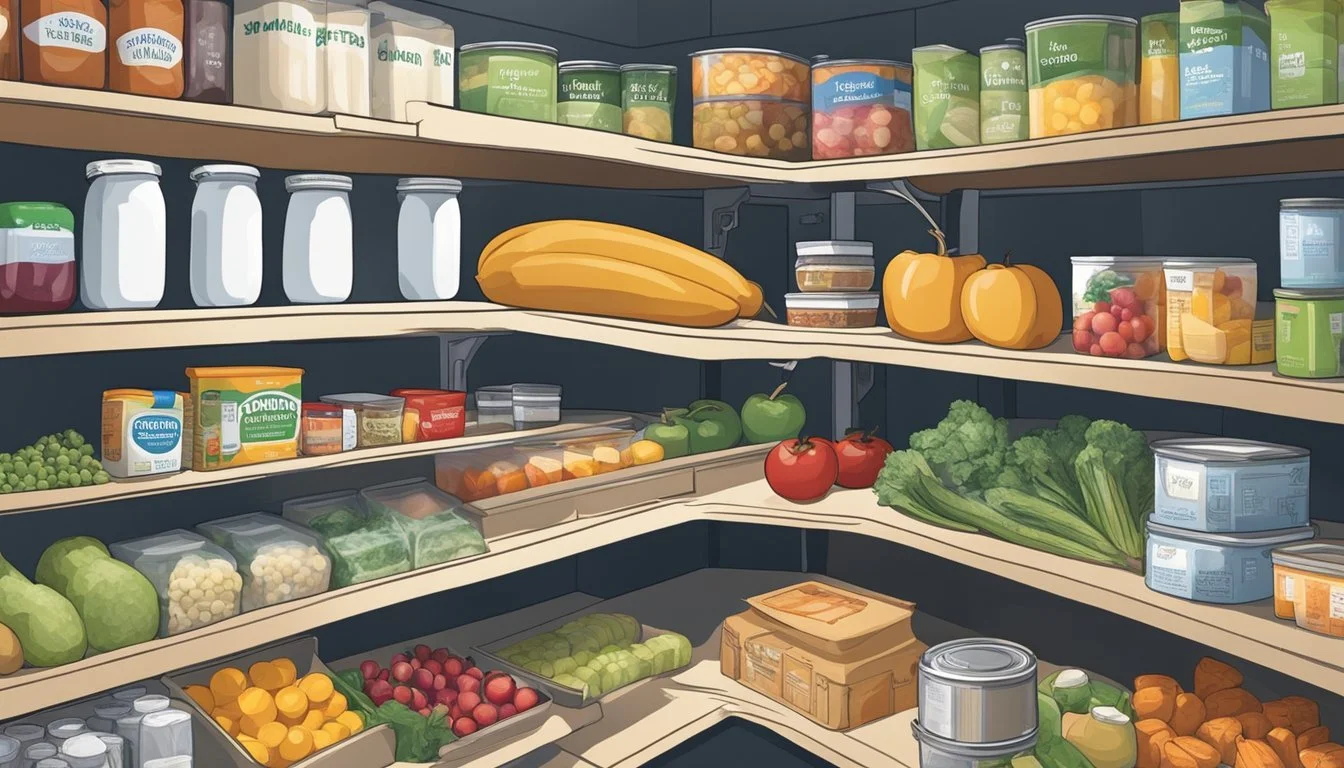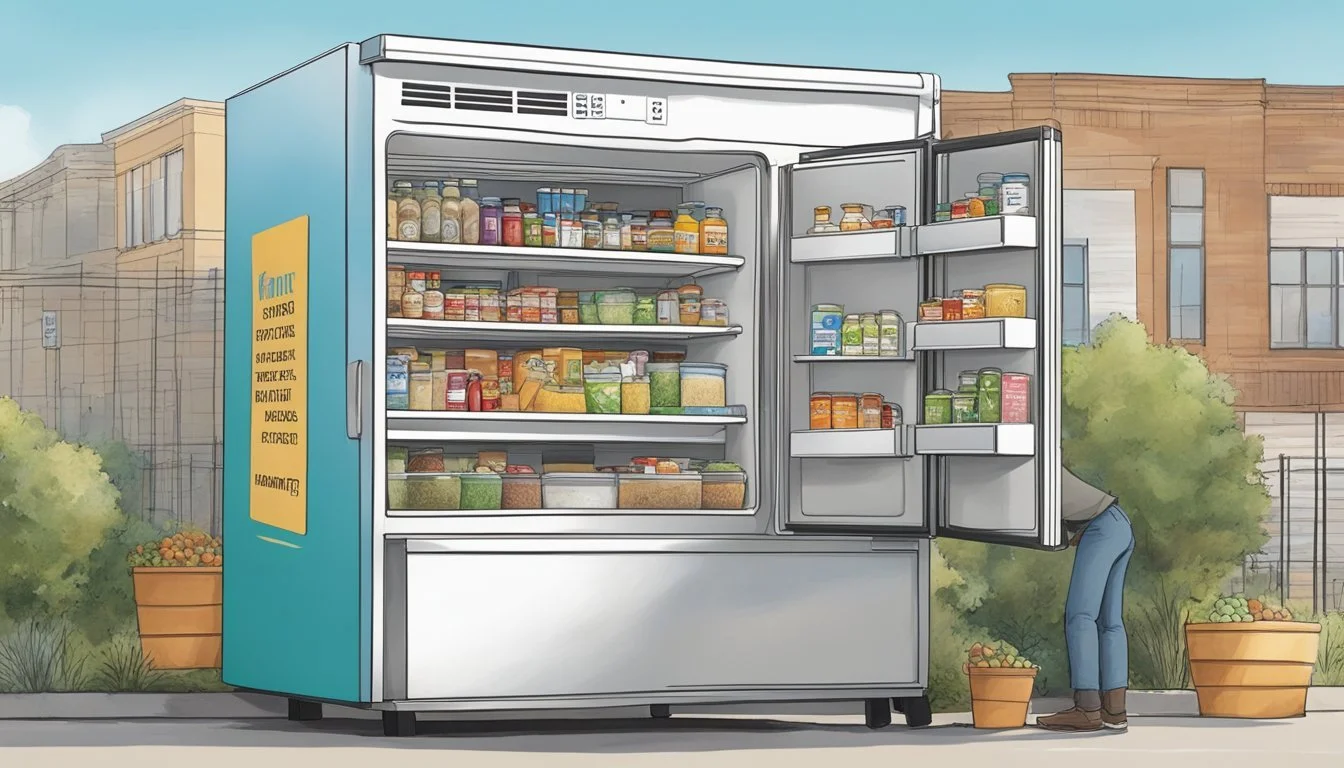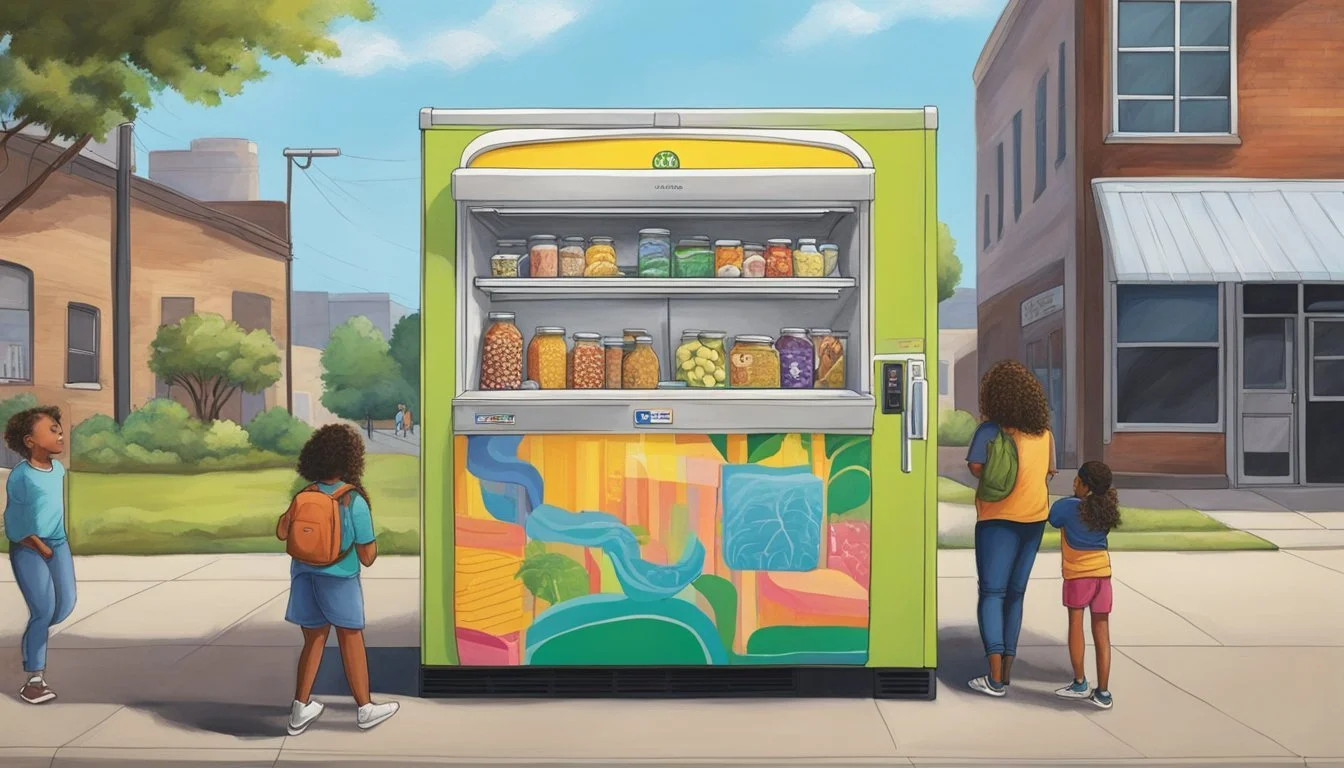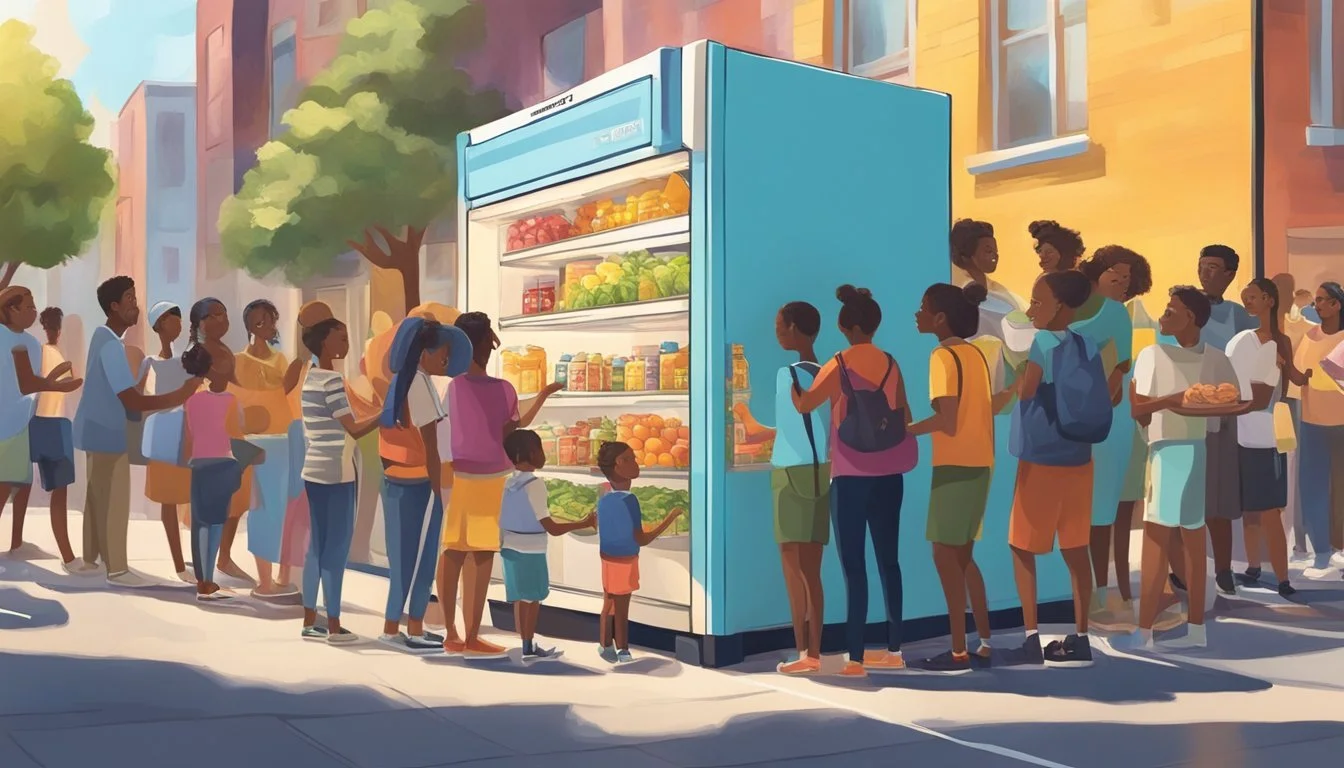Fort Worth, TX Community Fridge
A New Wave of Food Sharing Initiatives
In Fort Worth, Texas, the Funky Town Fridge initiative represents a community's effort to address hunger and food insecurity. With various locations across the city, including Poly, Stop 6, NorthSide, Westside, and Southside neighborhoods, these community fridges offer a place where individuals can freely access food. The project not only provides sustenance to those in need but also serves as a platform for education on food waste and sustainability.
The fridges are maintained by volunteers, facilitating a system where residents can give and take perishable and non-perishable items as needed. This grassroots project was founded by Kendra Richardson, a local advocate, and has been met with strong community support. By allowing unrestricted access to food, the Funky Town Fridge project is a testament to the power of community-driven solutions in tackling social challenges.
Fort Worth Community Fridge Overview
Community fridges in Fort Worth have become a pivotal resource in fighting hunger and reducing food waste. Specifically, the Funky Town Fridge initiative stands out as a notable program aimed at empowering communities through accessible food aid.
A Brief History of Community Fridges
Community fridges are public refrigerators that serve as a grassroots response to food insecurity, allowing anyone to leave or take food. In Fort Worth, this concept gained traction when local advocates saw an opportunity to offer free food sources for those in need while addressing the issue of food waste.
Funky Town Fridge: A Case Study
Funky Town Fridge represents a successful example of community fridges in Fort Worth. Spearheaded by community advocate Kendra Richardson, the program has placed multiple fridges around the city. These fridges offer free, accessible food, and are regularly stocked by community members and volunteers, reflecting a strong communal effort to end food insecurity locally.
The Mission and Goals
In Fort Worth, Texas, community fridges serve as a beacon of support, addressing critical challenges such as food insecurity and promoting food sovereignty. These fridges not only provide immediate access to food but also foster a sense of community and mutual aid.
Combating Food Insecurity
Funky Town Fridge, an initiative launched by community advocate Kendra Richardson, operates with the steadfast goal of alleviating hunger in Fort Worth. By installing community fridges in diverse neighborhoods—Poly, Stop 6, NorthSide, Westside, and Southside—the project ensures that residents have free access to nutritious food. This addresses the urgent need where traditional food systems may fall short, mitigating the impact of food apartheid and ensuring that no individual or family goes without the basic necessity of food.
Key Objective: Free, unfettered access to food.
Target Areas: Strategically placed in neighborhoods with identified needs.
Community Impact: Directly reduces the rates of food insecurity.
Promoting Food Sovereignty
The vision of Funky Town Fridge extends beyond providing immediate sustenance; it aims to empower communities. The project seeks to end food apartheid by giving communities control over their food sources. This includes plans to raise funds for critical resources like a new van and a building for additional storage and educational activities, such as nutrition classes.
Long-Term Goal: Raise $80,000 for operational expansion and educational endeavors.
Educational Aspirations: Teach nutritional self-sufficiency to Fort Worth residents.
By encouraging local involvement and providing the tools for self-sustenance, Funky Town Fridge embodies the essence of mutual aid, community support, and the true spirit of sharing.
Locations and Accessibility
The community fridge initiative in Fort Worth, Texas, known as Funky Town Fridge, has established multiple fridge locations to combat food insecurity. The initiative ensures that the fridges are effortlessly reachable to the community they serve.
Neighborhoods Served
Funky Town Fridge operates fridges in several neighborhoods within Fort Worth, illustrating a hands-on approach to addressing local food insecurity. Below is a list of specific neighborhoods where community fridges have been placed:
Southside: Postcode 76110, catering to a densely populated area with diverse food needs.
Poly: Postcode 76105, another focal point for community support via accessible nutritious food.
Other neighborhoods served include Poly, Stop 6, NorthSide, and Westside.
Accessibility Initiatives
A core tenet of Funky Town Fridge is to maintain 24/7 accessibility for all fridges, ensuring they are straightforward to use for everyone in need. The fridges and pantries are placed in outdoor spaces, accessible at any hour without any prerequisites such as sign-ups or qualification checks. This intentional design promotes a stigma-free way for individuals to obtain food, reflecting an understanding of varied schedules and circumstances that might limit access to conventional assistance programs.
How Community Fridges Work
Community fridges in Fort Worth operate as part of a collaborative initiative to address food insecurity by providing free food to anyone in need. This innovative model leverages local support and volunteer efforts to maintain a sustainable system of food sharing.
The Role of Volunteers
Volunteers are the backbone of the community fridge operations. They take on responsibilities that include stocking, cleaning, and monitoring the refrigerators, ensuring the food is safe to eat and accessible. These individuals often work in shifts to manage the various tasks:
Stocking the fridge: Ensuring a consistent supply of fresh food.
Cleaning duties: Regularly cleaning the fridges to maintain hygiene standards.
Monitoring for safety: Checking expiration dates and food quality.
A detailed schedule is often put in place, with volunteers signing up for tasks according to their availability.
Donation Guidelines
Donation guidelines are critical to the success of community fridges. They ensure that all contributions are safe to consume and in line with health regulations. The typical guidelines for donations might include:
Sealed and labeled:
All donated items should be sealed and clearly labeled with expiration dates.
Fresh produce preferred:
Fruits and vegetables are highly encouraged as they provide essential nutrients.
No raw meats:
To minimize health risks, raw meats are often excluded from donations.
Non-perishable items:
Canned and dry goods that have long shelf lives are ideal for stocking the fridge.
These guidelines help maintain a standard of quality and safety for all items within the community fridges.
Community Involvement and Support
Community fridges in Fort Worth, Texas, exemplify a sustainable support structure for families in need, largely attributed to local business partnerships and active community member participation.
Local Businesses and Partnerships
Numerous local businesses have forged partnerships with community fridge initiatives to provide reliable support. These partnerships are pivotal for the long-term sustainability of the fridges. Businesses contribute through:
Donations: Monetary or essential items.
Logistical support: Assisting with fridge maintenance and operations.
Promotion: Raising awareness of the community fridge project.
Community Member Participation
Community members are at the heart of the initiative, volunteering their time and resources. Their involvement includes:
Stocking the fridges: Ensuring a consistent supply of fresh food.
Maintaining cleanliness and safety: Regular checks to keep the fridges clean and the food safe for consumption.
Educating others: Spreading the word to increase community involvement and support.
Items Found in Community Fridges
In Fort Worth, community fridges are a vital resource for individuals and families in need, providing free food and essentials. These fridges are typically stocked with a variety of items to address food insecurity and support nutritional needs. Here is a breakdown of the common types of foods and beverages one can find in such community refrigeration systems.
Beverages:
Bottled Water: Ensuring hydration, bottled water is a mainstay.
Milk: Often available for its nutritional value.
Daily Staples:
Eggs and Cheese: Protein sources are regularly provided.
Fresh Produce: Fruits and vegetables are crucial for a balanced diet.
Nutritious Packaged Food:
Canned Goods: These may include vegetables, soups, and beans.
Nutritious Food: Packaged items that are non-perishable and healthy.
The emphasis is on providing nutritious food to support a balanced diet. Community fridges aim to offer a range of foods that can meet the basic dietary requirements of a person or family. They are continually replenished to ensure ongoing access to these essential items. Volunteers and community members often contribute to maintaining the stock levels, ensuring the availability of Fresh Produce like fruits and vegetables, which are vital for well-being. While the actual contents of a community fridge can vary depending on donations and community support, the goal remains consistent: to provide vital food resources that are accessible to all.
Impact of the Pandemic
The COVID-19 pandemic significantly affected Fort Worth communities, especially in terms of food security. This section examines the specific adversities and how the community responded resiliently.
Challenges Faced
The onset of the COVID-19 pandemic created unprecedented challenges for residents of Fort Worth. Many individuals found themselves struggling to afford basic necessities due to job losses and economic instability. Access to nutritious food became a primary concern as more families faced food insecurity. Community resources were strained, highlighting the need for immediate and innovative solutions to address the growing hunger crisis.
Community Resilience
In response, Fort Worth witnessed a surge in community-driven initiatives aimed at providing relief, specifically through the emergence of community fridges. These fridges, stocked with free food, became lifelines for many. Spearheaded by local individuals and organizations, the concept of community fridges demonstrated the community's resilience and ability to mobilize resources quickly. The Funky Town Fridge program, for example, expanded its reach by opening additional locations, directly addressing the food scarcity caused by the pandemic and ensuring continued support for vulnerable populations.
Success Stories and Testimonials
This section explores the difference the Fort Worth's community fridge initiative has made, showcasing how neighborhoods have been transformed and recounting personal experiences of the individuals it has helped.
Transforming Neighborhoods
In Fort Worth, the Funky Town Fridge project has ushered in a wave of positive changes across multiple neighborhoods. Where food scarcity once loomed, communal refrigerators have become beacons of hope and solidarity. Community fridges, strategically located in the Como, Southside, and Poly areas, have made nutritious food more accessible. Neighborhoods, previously classified as food deserts, now experience a renewed sense of unity and care for one another, with residents frequently contributing to the fridges.
Personal Accounts of Aid
Individual stories reveal the community fridges' profound impact on community members, particularly on children and struggling families. Residents express an overwhelming sense of love and gratitude for the initiative. One Southside local mentioned, “It’s more than just food; it’s about knowing that we’re not alone in this struggle.” Another testimony from a mother in Como highlighted, “I can feed my children fresh fruits and vegetables, securing not just meals, but also their health and happiness.” These personal accounts are a testament to the true success of the Funky Town Fridge in forging connections and fostering community support.
Ongoing Challenges and Futures Outlook
Fort Worth's community fridge initiative continues to encounter systemic challenges while also laying out strategic plans for growth and better service provision.
Addressing Systemic Issues
Fort Worth's community fridges face ongoing systemic challenges, such as racism and food waste. Racism can affect the equitable distribution of food and resources, while waste remains a complex issue, as excess food must be regularly cleared to maintain health and safety standards. The nonprofit behind these community fridges works diligently to educate and involve all segments of the community, promoting inclusion and reducing waste.
Plans for Expansion and Improvement
The nonprofit aims to improve the current network of community fridges across Fort Worth with actionable plans for expansion. They have identified key neighborhoods that could benefit from additional fridges. This plan involves:
Installing new community fridges in high-need areas.
Upgrading existing fridges for better efficiency and reliability.
Persistent efforts continue in parallel to secure funding and support to ensure these improvements materialize, ensuring that the community fridge project becomes an enduring asset within Fort Worth.
Connecting with the Movement
The Funky Town Fridge initiative in Fort Worth, Texas, offers multiple avenues for community engagement and support. Those interested can connect and contribute through an established online presence and direct participation.
Social Media and Online Presence
Website: The official Funky Town Fridge website acts as a central resource for news, fridge locations, and volunteer opportunities.
Instagram: On Instagram, @FunkyTownFridge provides regular updates, shares stories, and increases awareness through vivid imagery and community highlights.
Twitter: For real-time updates and community engagement, followers can check out Funky Town Fridge's Twitter account.
Facebook: Their Facebook page serves as a platform for event announcements and fostering community discussions.
How to Get Involved
Donations: Community members can contribute food items directly to the fridges located in Poly, Stop 6, NorthSide, Westside, and Southside neighborhoods.
Volunteer: Opportunities to volunteer can be found on their website, ranging from fridge stocking to maintenance.
Spread the Word: Advocates can help by sharing Funky Town Fridge's mission on social media, using hashtags and tagging the initiative to raise awareness.
Educational and Outreach Programs
The educational component of Fort Worth's Community Fridge Program focuses on fostering resilience through resource sharing and knowledge distribution. These initiatives are designed to educate the community about food insecurity and provide tools to address it.
Workshops and Events
Community workshops and events are essential to the mission of educating residents about food sustainability and waste reduction. These gatherings often feature experts from various organizations who share their insights on how to leverage local resources. For example, Greenhouse 817 hosts events that teach the importance of fresh produce and how community efforts can lead to empowered neighborhoods.
Partnership with Schools and Nonprofits
The program forms strategic partnerships with local schools and nonprofits to strengthen its outreach. By involving students and community members, these collaborations aim to instill a sense of solidarity and collective power in Fort Worth's fight against hunger. The partnerships also serve as a platform for hosting food drives and awareness campaigns, further embedding the Community Fridge Program into the fabric of local action.
Additional Resources
This section provides information on further support for individuals seeking food assistance as well as guidance for those interested in establishing community fridge initiatives.
External Food Assistance Programs
Fort Worth residents can access a variety of food assistance programs beyond community fridge projects. These programs often work in cooperation with local grocery stores and activists to hold food drives and distribute essential items, including butter, hygiene products, and various groceries.
Food Banks: The Tarrant Area Food Bank offers a wide range of support for those in need.
SNAP Benefits: Individuals may apply for the Supplemental Nutrition Assistance Program (SNAP) for grocery aid.
Meals on Wheels: This program provides meals to qualifying individuals who are homebound.
School Programs: Various schools in Fort Worth offer breakfast and lunch programs for children.
Guides for Starting a Community Fridge
For those motivated by activists like Kendra Richardson and interested in starting their own community fridge project, the following resources can be invaluable:
Safety and Sanitation Guidelines: It is crucial to ensure all food is safe to consume and stored properly.
Partnerships with Local Businesses: Engaging with local grocery stores can help stock the fridge with essential items.
Community Engagement: Successful community fridges rely on active promotion and community involvement to sustain operations.
Table: How to Start a Community Fridge
Step Description Research Understand local needs and regulations. Location Secure a place with high foot traffic and business support. Infrastructure Acquire a fridge and ensure a power supply. Health and Safety Develop a plan to maintain the cleanliness and safety of the fridge. Community Involvement Promote the fridge’s purpose and enlist community support for regular donations and upkeep. Monitoring and Maintenance Regular checks to ensure the fridge is well-stocked and in good condition.
Cultural and Artistic Contributions
The community fridge movement in Fort Worth, TX, has become more than just a means to combat food insecurity; it's a canvas for cultural expression. Through local artwork and engagement activities, these hubs of nutrition also serve as points of communal pride and cultural connectivity.
Local Artists and Murals
Fort Worth's community fridges are not only functional but also aesthetically enriched by local artists, transforming utility into art. Murals adorn the fridges, infusing neighborhood streets with vibrancy. These artworks go beyond mere decoration, becoming symbols of the community's resolve and spirit. Each mural embodies stories and visions unique to the neighborhood it resides in, encapsulating a sense of geography and place.
Community Events
In conjunction with the daily operation of the fridges, community events create opportunities for cultural celebration. These events often involve food and games, fostering social cohesion while addressing food insecurity. They function as platforms where individuals can engage with one another, share experiences, and eliminate the shame often associated with hunger. Pantries set up during these events not only provide sustenance but also encourage unity through the shared goal of supporting those within the community.
Testimonials and Stories
The community response to the Fort Worth, TX Community Fridge initiative reveals impactful stories and noteworthy efforts by volunteers. These testimonials reflect the tangible benefits for residents, where access to healthy food has been vital, particularly for communities like Stop 6 and the Southside neighborhood.
Voices from the Community
Residents from various sectors of Fort Worth, including Stop 6 and the Westside, have expressed their appreciation for the program. A testimonial from a single mother residing in the Southside Neighborhood mentions how the community fridge has been a lifeline, ensuring her children have access to nutritious food. She states, "The fridge gives us fruits and vegetables we can't normally afford; it's like having a piece of Whole Foods right in our neighborhood."
On the Westside, a senior citizen reflects on the importance of the initiative: "Before the community fridges, I struggled to get enough to eat that was good for me. Now, I've got healthy options just a walk away." Community members in areas such as New Orleans Street praise the project for aiding those who might be hesitant to ask for help elsewhere.
Highlighting Volunteer Efforts
Volunteers are the backbone of the Fort Worth Community Fridge project. Their dedication ensures that the fridges are stocked and maintained. Lauren Selking, a local who donates monthly, says, "I can see the difference we make. It's not just about feeding; it's about uplifting our neighbors."
A table reflecting volunteer contributions in the Stop 6 area:
Date Items Donated Volunteer Name 2024-02-10 Fresh vegetables, bread John Doe 2024-02-15 Canned goods, baby formula Jane Smith
Volunteers source and provide healthy food options, which is especially beneficial for residents with young children. In the community's words, the project is more than a food source—it is a symbol of solidarity and care within Fort Worth.

